'There is a degree of civility, efficiency, cleanliness and cultural ease here that has all but vanished in the squalid, chaotic and rootless Hindi heartland,' says Sunil Sethi.

It was Salman Rushdie who observed many years ago that south India not only felt, but functioned like another country.
After a recent 10-day coast-to-coast journey in Kochi, then Chennai to Puducherry along the scenic East Coast Road -- taking in the splendid 10-acre Dakshina Chitra 'living' museum and the rock-cut temples of Mahabalipuram -- Mr Rushdie's insight holds unshakably true.
There is a degree of civility, efficiency, cleanliness and cultural ease here that has all but vanished in the squalid, chaotic and rootless urban agglomerations of the Hindi heartland.
Above the cash counter at a large highway eatery serving vegetarian thalis in Tamil Nadu was a notice in bold lettering that summed up the sense of fair play: 'Dear Customers, Pls. Demand Bill for Your Purchase. If not give call (three cell numbers given) to Get Your Purchase Absolutely Free'.
Kerala and Tamil Nadu are the quiet champions of India. You can banish the creeping trepidation of encounters with boorish, unhelpful functionaries, the push-and-shove of public places, or sullen drivers of smelly car-hailing rides who either fail to arrive, are often clueless about routes or unable to use GPS.
In southern cities, Uber drivers answer promptly, arrive within minutes, and know their way about; officials may have gone to village schools but speak perfect English; pedestrian pavements are wide and women safe on the streets after dark.
Some reasons for these well-ordered standards of civic life are obvious: Both states have zero population growth, 100 per cent literacy, and high levels of investment in education, health care and public transport -- Kochi's car ferries, for example, work to a clockwork time table.
Principal among the tangible changes I noticed is a shedding of provincialism for a surge in cosmopolitan confidence.
A shining example of this is the fourth Kochi-Muziris Biennale, the country's biggest and longest international art show, an event so exhilarating in the city's historic Fort precinct that it makes exhibitions in Delhi, Mumbai and Bengaluru look like Cinderella's shop-soiled stepsisters.
Despite the constraints imposed by last year's floods last year, the government came through with generous financial support; indeed, it helped marshall so many private sponsors, led by Yusuff Ali, the Gulf's supermarket king, that the list takes up 17 pages of the biennale's fat catalogue.
The world-class show continues till March 31, featuring some 99 artists from 30-odd countries in a dozen venues, many of them in restored government buildings and abandoned spice warehouses.

For those planning a visit here are three top picks: South African artist William Kentridge's enthralling panoramic eight-screen video of a processional to the sound of brass bands; Shilpa Gupta's vast dark room installation of a 100 microphones and glimmering bulbs that echo the voices of poets; and Priya Ravish Mehra's haunting works with Kashmiri rafugaars (repairers of shawls) that reprise the pain of a body that did not heal.
Ms Mehra succumbed to cancer last year and her art is a moving last testament.
The Kochi biennale is an institution-in-the-making but it is a novice as compared to the century-old musical sabhas of Chennai in January-February, the apogee of the cultural calendar.
Something like a hundred venues feature the best in Carnatic music and classical dance; at the apex is the Music Academy, run by the city fathers, to regimental perfection.
From early morning to late evening a succession of concerts follows an exact, well-advertised plan in a hall with state-of-the-art acoustics. No delay is brooked; no one gets in for free; excellent meals and coffee are served at precise breaks.
Nowhere else in the country can you encounter such engaged or knowledgeable audiences that come from distant cities.
A senior executive I met said he bought family season tickets for two weeks each year. "It is my happiest time off."
In its 90th cycle last month a star guest was Indra Nooyi, proud daughter of the city, and cousin of the classical vocalist Aruna Sairam.
One reason for the enduring success of these institutions is their independence from government interference, unlike New Delhi, where mouldering decay is hastened with philistine appointments and changing political dispensations.
Captivated by the zeitgeist, young professionals are moving south in search of not just a relaxed vibe but opportunities in the travel and hospitality business.
A young couple from Mumbai moved to Kochi, they told me, not just for the quality of life but better prospects.
They now run customised tours and a boutique aptly named Kingdom of Calm. They enthusiastically Whatsapped me the best eateries including 'the most fabulous Kerala beef fry'.
In Puduchery's elegantly revived French quarter, Sid Saikia quit apparel exports in Delhi to put his savings into restoring a 19th century Indo-French courtyard house as a homestay. He calls it Gratitude.
A small brass plaque at the door reads: 'If you are looking for a room please ring the doorbell.'
The 18th century political philosopher Edmund Burke decreed that good manners were more important than good laws. Several aspects of south India are proof of his axiom.












 © 2025
© 2025